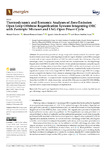Thermodynamic and Economic Analyses of Zero-Emission Open Loop Offshore Regasification Systems Integrating ORC with Zeotropic Mixtures and LNG Open Power Cycle

Use este enlace para citar
http://hdl.handle.net/2183/32329Coleccións
- GI- INGEN-Artigos [18]
Metadatos
Mostrar o rexistro completo do ítemTítulo
Thermodynamic and Economic Analyses of Zero-Emission Open Loop Offshore Regasification Systems Integrating ORC with Zeotropic Mixtures and LNG Open Power CycleDirector(es)
Data
2022Cita bibliográfica
Naveiro, M.; Romero Gómez, M.; Arias-Fernández, I.; Baaliña Insua, Á. Thermodynamic and Economic Analyses of Zero-Emission Open Loop Offshore Regasification Systems Integrating ORC with Zeotropic Mixtures and LNG Open Power Cycle. [Special Issue Applications and New Technologies of Waste Heat Recovery] Energies 2022, 15(22), 8622. https://doi.org/ 10.3390/en15228622
Resumo
[Abstract] The present study provides an energy, exergy and economic analysis of a seawater regasification system (open loop) combining stages of simple organic Rankine cycles (ORCs) arranged in series with an open organic Rankine cycle (OC) in order to exploit the cold energy of liquefied natural gas (LNG). The proposed system, termed ORC-OC, is implemented in a Floating Storage Regasification Unit (FSRU) to achieve the objective of zero greenhouse emissions during the regasification process. Configurations of up to three stages of ORCs and the use of zeotropic mixtures of ethane/propane and n-butane/propane as working fluids are considered in the study of the novel regasification system. Only the two-stage ORC-OC (2ORC-OC) and three-stage (3ORC-OC) configurations accomplish the objective of zero emissions, attaining exergy efficiencies of 61.80% and 62.04%, respectively. The overall cost rate of the latter, however, is 20.85% greater, so the 2ORC-OC results as being more cost-effective. A comparison with conventional regasification systems installed on board shows that the 2ORC-OC yields a lower total cost rate if the LNG price exceeds 8.903 USD/MMBtu. This value could be reduced, however, if the electrical power that exceeds the FSRU’s demand is exported and if compact heat exchangers are implemented.
Palabras chave
Floating storage regasification unit
Exergy analysis
Economic analysis
Liquefied natural gas cold energy
Organic rankine cycle
Exergy analysis
Economic analysis
Liquefied natural gas cold energy
Organic rankine cycle
Dereitos
Atribución 3.0 España
ISSN
1996-1073






